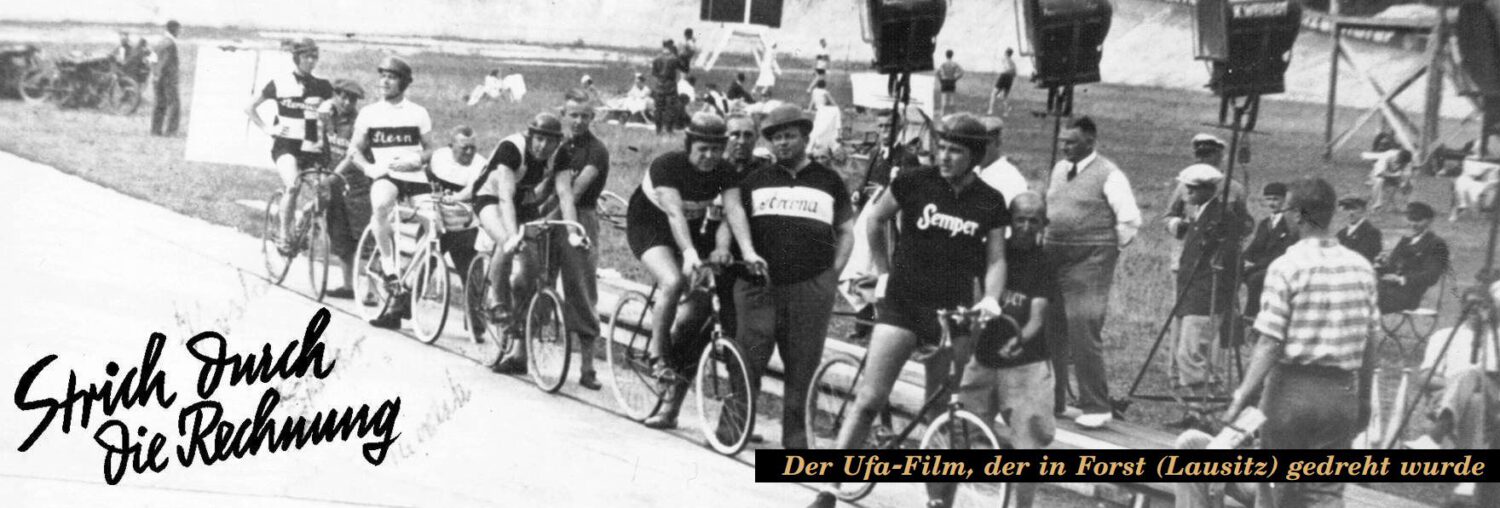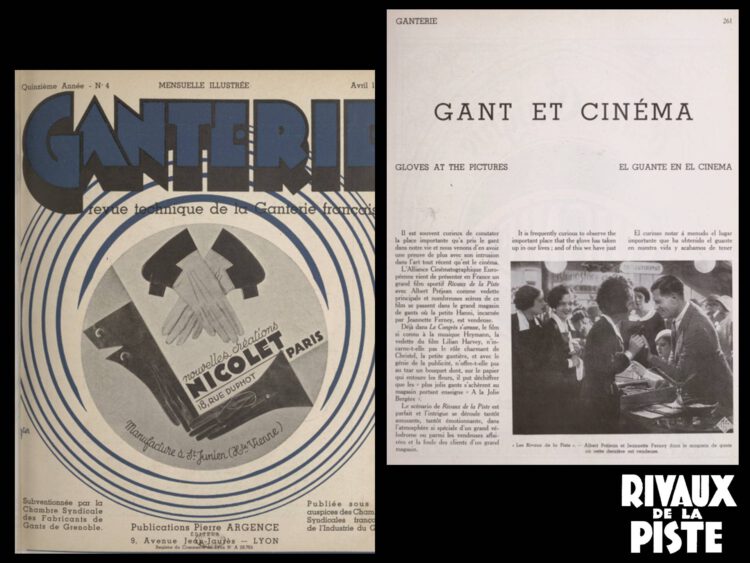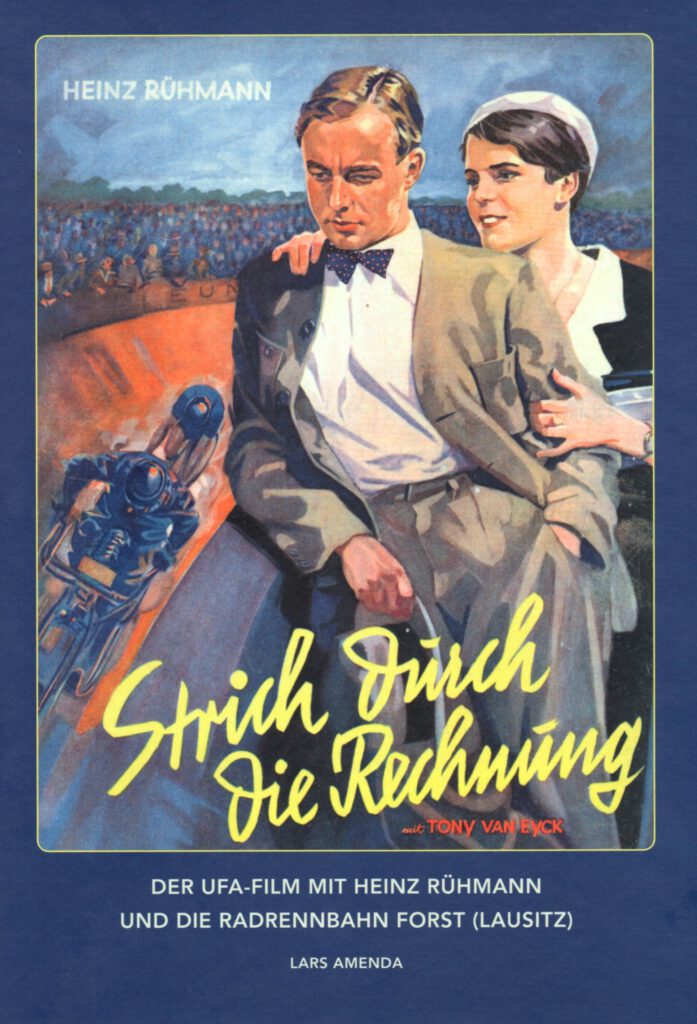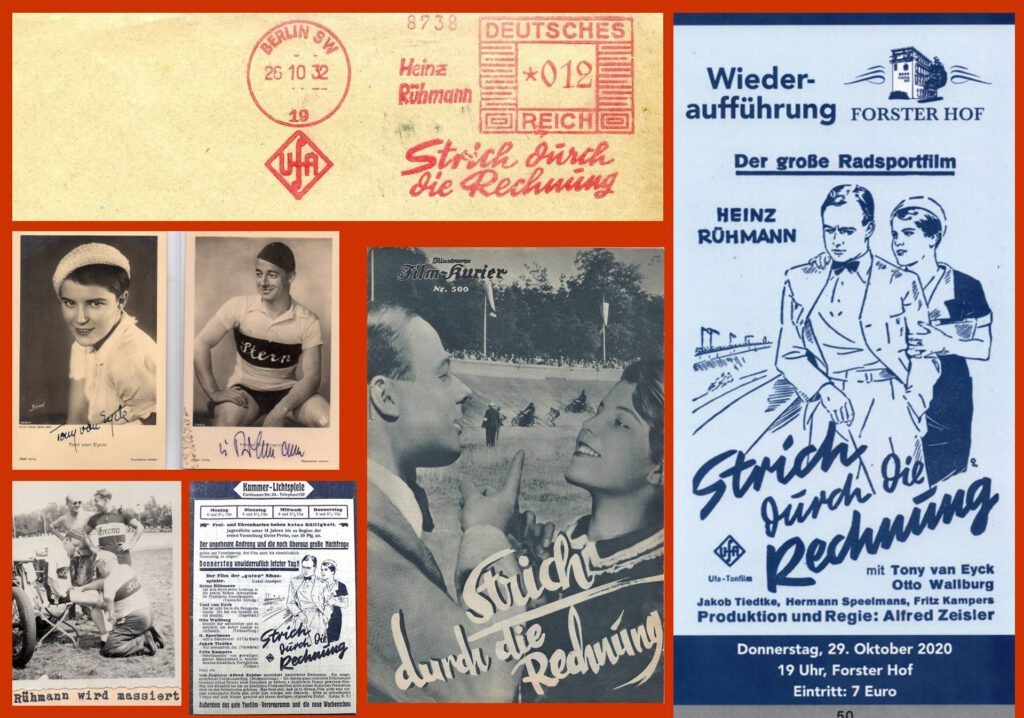… das schreibt das französische Fachblatt „Ganterie“- Organ der französischen Handschuhindustrie vom April 1933.
In drei Sprachen, Französisch, Englisch und Spanisch wird der Film „Rivaux de la Piste“ auf insgesamt drei Seiten vorgestellt. Vor allem spürt man dabei die Freude des Redakteures, der davon ausgeht, dass der Film sich positiv auf die Geschäfte Handschuhindustrie und Fachgeschäfte auswirkt.
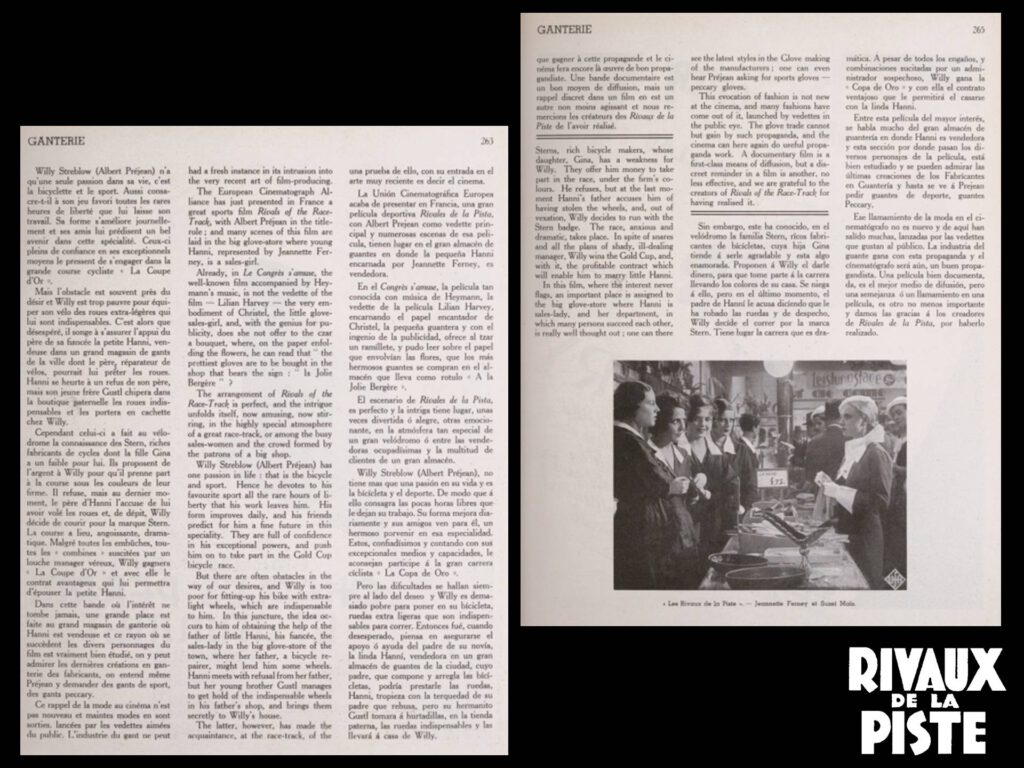
Aber lesen Sie selbst. Wir haben hier den englischen Text übersetzt.
HANDSCHUHE IM KINO
Es ist immer wieder interessant zu beobachten, welch wichtigen Platz der Handschuh in unserem Leben eingenommen hat; und wir haben gerade ein neues Beispiel für sein Eindringen in die sehr junge Kunst der Filmproduktion erlebt. Die Europäische Kinematographen-Allianz hat gerade in Frankreich den großen Sportfilm „Rivalen der Rennbahn“ mit Albert Préjean in der Titelrolle vorgestellt; und viele Szenen dieses Films spielen in dem großen Handschuhgeschäft, in dem die junge Hanni, dargestellt von Jeannette Ferney, Verkäuferin ist. Schon in „Der Kongress tanzt“, dem bekannten, von Heymanns Musik begleiteten Film, ist die berühmte Schauspielerin des Films – Lilian Harvey – nicht das Ebenbild von Christel, der kleinen Handschuhverkäuferin, und bietet sie, mit dem Genie für Scherzhaftigkeit, dem Zaren nicht einen Strauß an, wo er auf dem Papier, das die Blumen umhüllt, lesen kann, dass „die schönsten Handschuhe in dem Laden zu kaufen sind, der das Zeichen trägt: „la Jolie Bergère“? Das Arrangement von „Rivalen der Rennbahn“ ist perfekt, und die Intrige entfaltet sich mal amüsant, mal aufwühlend in der hochspeziellen Atmosphäre einer großen Rennbahn oder unter den geschäftigen Verkäuferinnen und dem Gedränge der Kundschaft eines großen Geschäfts. Willy Streblow (Albert Préjean) hat im Leben nur eine Leidenschaft: das Fahrrad und den Sport. Daher widmet er die wenigen Stunden, die ihm seine Arbeit lässt, seinem Lieblingssport. Seine Form verbessert sich täglich, und seine Freunde sagen ihm eine gute Zukunft voraus. Sie sind voller Vertrauen in seine außergewöhnlichen Fähigkeiten und drängen ihn, am Gold-Cup-Radrennen teilzunehmen. Doch oft stehen den Wünschen Hindernisse im Weg, und Willy ist zu arm, um sein Fahrrad mit extra leichten Rädern auszustatten, die für ihn unentbehrlich sind. Da kommt ihm die Idee, den Vater der kleinen Hanni, seiner Verlobten, die Verkäuferin im großen Handschuhgeschäft der Stadt, um Hilfe zu bitten, ob ihr Vater, ein Fahrradmechaniker, ihm ein paar Räder leihen könnte. Hanni stößt bei ihrem Vater auf Ablehnung, aber ihrem kleinen Bruder Gustl gelingt es, die unentbehrlichen Räder im Geschäft seines Vaters zu ergattern und heimlich zu Willy zu bringen. Dieser hat jedoch auf der Rennbahn die Bekanntschaft der Sterns gemacht, reiche Fahrradhersteller, deren Tochter Gina eine Schwäche für Willy hat. Sie bieten ihm Geld an, damit er unter den Farben der Firma am Rennen teilnimmt. Er lehnt ab, aber im letzten Moment beschuldigt ihn Hannis Vater, die Räder gestohlen zu haben, und aus Verärgerung beschließt Willy, mit dem Stern-Logo zu fahren. Das Rennen, spannend und dramatisch, findet statt. Trotz aller Fallstricke und der Pläne eines zwielichtigen, schlecht handelnden Managers gewinnt Willy den Gold Pokal und damit den lukrativen Vertrag, der ihm die Heirat mit der kleinen Hanni ermöglicht. In diesem Film, in dem das Interesse nie nachlässt, wird dem großen Handschuhgeschäft, in dem Hanni Verkäuferin ist, ein wichtiger Platz zugewiesen, und ihre Abteilung, in der viele Personen einander ablösen, ist wirklich gut durchdacht; man kann dort die neuesten Stile in der Handschuhmacherei der Hersteller sehen; man kann sogar Préjean hören, wie er nach Sporthandschuhen fragt – nach Peccary-Handschuhen. Diese Art von Mode ist im Kino nicht neu, und viele Moden haben sich daraus entwickelt, die von Schauspieler-Berühmtheiten in der Öffentlichkeit lanciert wurden. Der Handschuhhandel kann von solcher Propaganda nur profitieren, und das Kino kann hier wieder nützliche Propagandaarbeit leisten. Ein Dokumentarfilm ist ein erstklassiges Mittel der Verbreitung, aber eine diskrete Erinnerung in einem Film ist ein anderes, nicht weniger wirksames Mittel, und wir sind den Machern von Rivalen der Rennbahn dankbar, dass sie es realisiert haben.
GLOVES AT THE PICTURES
It is frequently curious to observe the important place that the glove has taken up in our lives ; and of this we have just had a fresh instance in its intrusion into the very recent art of film-producing. The European Cinematograph Alliance has just presented in France a great sports film Rivals of the Race- Track, with Albert Préjean in the title-role ; and many scenes of this film are laid in the big glove-store where young Hanni, represented by Jeannette Ferney, is a sales-girl. Already, in “Le Congrès s’amuse”, the well-known film accompamed by Heymann’s music, is not the vedette of the film — Lilian Harvey — the very embodiment of Christel, the little glove-salesgirl, and, with the genius for publicity, does she not offer to the czar a bouquet, where, on the paper enfolding the flowers, he can read that “ the prettiest gloves are to be bought in the shop that bears the sign: “la Jolie Bergère” ? The arrangement of Rivals of the Race-Track is perfect, and the intrigue unfolds itself, now amusing, now stir- ring, in the highly special atmosphere of a great race-track, or among the busy sales-women and the crowd formed by the patrons of a big shop. Willy Streblow (Albert Préjean) has one passion in life: that is the bicycle and sport. Hence he devotes to his favourite sport ail the rare hours of liberty that his work leaves him. His form improves daily, and his friends predict for him a fine future in this speciality. They are full of confidence in his exceptional powers, and push him on to take part in the Gold Cup bicycle race. But there are often obstacles in the way of our desires, and Willy is too poor for fitting-up his bike with extra- light wheels, which are indispensable to him. In this juncture, the idea occurs to him of obtaining the help of the father of little Hanni, his fiancée, the sales-lady in the big glove-store of the town, where her father, a bicycle repairer, might lend him some wheels. Hanni meets with refusal from her father, but her young brother Gustl manages to get hold of the indispensable wheels in his father’s shop, and brings them secretly to Willy’s house.
The latter, however, has made the acquaintance, at the race-track, Sterns, rich bicycle makers, whose daughter, Gina, has a weakness for Willy. They offer him money to take part in the race, under the firm’s colours. He refuses, but at the last moment Hanni’s father accuses him of having stolen the wheels, and, out of vexation, Willy decides to run with the Stern badge. The race, anxious and dramatic, takes place. In spite of snares and ail the plans of shady, ill-dealing manager, Willy wins the Gold Cup, and, with it, the profitable contract which will enable him to marry little Hanni. In this film, where the interest never flags, an important place îs assigned to the big glove-store where Hannis sales-lady, and her department, in which many persons succeed each other, is really well thought out ; one can there see the latest styles in the Glove making of the manufacturers ; one can even hear Préjean asking for sports gloves — peccary gloves. This evocation of fashion is not new at the cinema, and many fashions have come out of it, launched by vedettes in the public eye. The glove trade cannot but gain by such propaganda, and the cinema can here again do useful propaganda work. A documentary film is a firstclass means of diffusion, but a discreet reminder in a film is another, no less effective, and we are grateful to the creators of Rivals of the Race-Track for having realised it.
